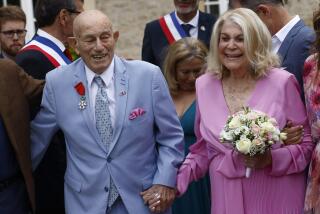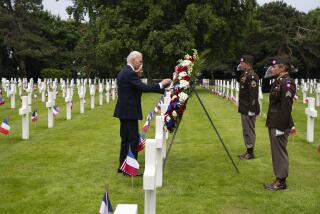Veteran Is Living History
- Share via
On a cold, dreary morning decades ago, Norbert Blaskowski stepped onto a Normandy beach as part of what was the largest invasion force in history.
“We were facing enemy fire,” said the 78-year-old Lake Forest resident. “They were shelling all over. Some ships were getting hit. Landing craft were getting hit, exploding in the air. It was just a horrible, horrible slaughter.”
Sunday was the 55th anniversary of that landing, better known as D-day, when 156,000 Allied soldiers came ashore on the 60 miles of Normandy beach and started their drive to regain control of Europe from Nazi Germany.
These days, Blaskowski, retired after working for the Defense Department for 24 years, leans heavily on his cane. But when he stands at attention, his body straightens and his arms snap crisply to his side as though he hasn’t aged since he served in Europe.
Blaskowski talks freely about his experiences in World War II, and he has become a fan of war movies. He watches documentaries on the History Channel and looks for himself in the films shot on Utah Beach on D-day. He hasn’t found himself yet.
But when he first returned from the war, wounded by a mine, he couldn’t talk about what he had seen. “I never discussed it,” he said. “It was too ugly.”
Blaskowski was a 23-year-old technical sergeant in the U.S. Army’s 4th Infantry Division when it invaded a beach code-named Utah by Allied forces. Although not as well known as the Omaha Beach of “Saving Private Ryan” fame, the carnage was still overwhelming.
“We were just praying to God, hoping you’ll make it. It’s difficult to explain how we felt. Scared,” Blaskowski said. “It was very hard to cope with, seeing guys dying in front of you.”
After fighting its way off the beach, the division’s first goal was to head inland a few miles to St.-Mere-Eglese and meet soldiers who had parachuted in behind enemy lines the night before.
In the French town was one of the Nazi’s key communications centers.
“Our objective was to destroy and disrupt communications as [Allied] troops came in,” Blaskowski said.
After knocking out the Nazi communication system, his troop advanced 15 miles to Cherbourg and captured the crucial port there. The Germans had mounted guns on platforms and were shooting at passing ships. The Germans would pull the guns into caves, shielding them from bombs.
It was up to the ground troops to get rid of those guns.
“We took them out with flamethrowers,” he said.
The division fought fierce battles in France, and on July 27, 1944, Blaskowski was wounded in St.-Lo by a booby-trapped grenade.
Although the military forbids taking souvenirs, an American soldier picked up a grenade lying next to a dead German. It was attached to a “bouncing Betty”--a mine that rose 6 feet and then exploded, spraying shrapnel.
The next few days were a blur. Allied forces had not yet set up hospitals in France, so Blaskowski had to be evacuated to England. Inclement weather delayed aircraft, leaving Blaskowski in a primitive medical tent for three days. Eventually, he was taken to a hospital in Taunton, England.
At least 20 pieces of metal had struck Blaskowski in the arms, legs, chest, neck and chin. Some passed through him. Surgeons removed most of the sharp metal bits, but four remain lodged in his body to this day.
Because of his injuries, he was sent back to the U.S. During the two-week voyage home, Japan surrendered. Blaskowski was discharged Sept. 2, 1945, and went home to Nanticoke, Penn.
When Blaskowski spoke of the battles and bloodshed, his voice confidently detailed his division’s objectives, and he precisely recalled the spellings of French cities he hadn’t seen in more than five decades. But his voice cracked and his hands shielded his eyes from a visitor when he discussed the most painful loss he suffered during World War II.
Five days before the war ended, Blaskowski’s younger brother, Leonard, was killed in Bavaria, Germany. He is buried in an American military cemetery in France.
“There are so many people that just take things for granted and don’t realize and appreciate what sacrifices veterans made,” he said. For young people, “it’s something out of history.”
“But we lived it,” his wife, Lorraine, said.
A younger generation of the Blaskowski family is taking this message to heart. Blaskowski’s nephew, Jeffrey Hassay of Fountain Valley, is backpacking across Europe this summer and plans to stop at Leonard Blaskowski’s grave.
More to Read
Sign up for Essential California
The most important California stories and recommendations in your inbox every morning.
You may occasionally receive promotional content from the Los Angeles Times.














